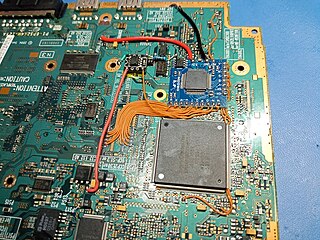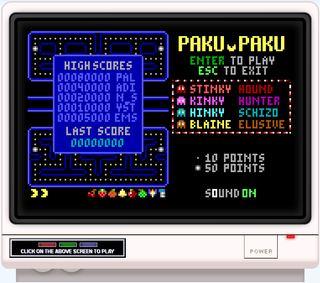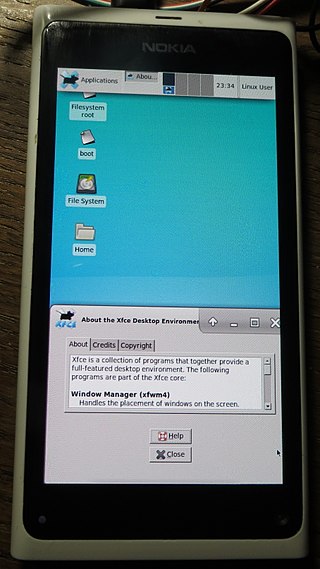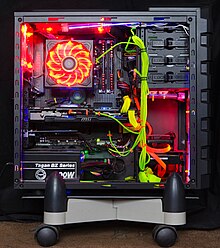
A video game console is an electronic device that outputs a video signal or image to display a video game that can be played with a game controller. These may be home consoles, which are generally placed in a permanent location connected to a television or other display devices and controlled with a separate game controller, or handheld consoles, which include their own display unit and controller functions built into the unit and which can be played anywhere. Hybrid consoles combine elements of both home and handheld consoles.

MAME is a free and open-source emulator designed to recreate the hardware of arcade game systems in software on modern personal computers and other platforms. Its intention is to preserve gaming history by preventing vintage games from being lost or forgotten. It does this by emulating the inner workings of the emulated arcade machines; the ability to actually play the games is considered "a nice side effect". Joystiq has listed MAME as an application that every Windows and Mac gamer should have.

A modchip is a small electronic device used to alter or disable artificial restrictions of computers or entertainment devices. Modchips are mainly used in video game consoles, but also in some DVD or Blu-ray players. They introduce various modifications to its host system's function, including the circumvention of region coding, digital rights management, and copy protection checks for the purpose of using media intended for other markets, copied media, or unlicensed third-party (homebrew) software.

Case modification, commonly referred to as case modding, is the modification of a computer case or a video game console chassis. Modifying a computer case in any non-standard way is considered a case mod. Modding is done, particularly by hardware enthusiasts, to show off a computer's apparent power by showing off the internal hardware, and also to make it look aesthetically pleasing to the owner.
Video game modding is the process of alteration by players or fans of one or more aspects of a video game, such as how it looks or behaves, and is a sub-discipline of general modding. Mods may range from small changes and tweaks to complete overhauls, and can extend the replay value and interest of the game.

Kodi is a free and open-source media player and technology convergence software application developed by the Kodi Foundation, a non-profit technology consortium. Kodi is available for multiple operating systems and hardware platforms, with a software 10-foot user interface for use with televisions and remote controls. It allows users to play and view most streaming media, such as videos, music, podcasts, and videos from the Internet, as well as all common digital media files from local and network storage media, or TV gateway viewer.

A personal computer game, also known as computer game or abbreviated PC game, is an electronic game played on a personal computer (PC) and form of video game. They are defined by the open platform nature of PC systems.
Homebrew, when applied to video games, refers to games produced by hobbyists for proprietary video game consoles which are not intended to be user-programmable. The official documentation is often only available to licensed developers, and these systems may use storage formats that make distribution difficult, such as ROM cartridges or encrypted CD-ROMs. Many consoles have hardware restrictions to prevent unauthorized development.
bit-tech is an online magazine for computer hardware enthusiasts, gamers and case modders, based in the UK. It was founded in 2000, became a fully professional online publication in 2005, and announced its acquisition by Dennis Publishing in October 2008. Dennis Publishing then partnered the site with existing monthly publication Custom PC magazine, making Bit-Tech the online version of the magazine. At this point the two editorial teams were totally integrated. However, due to a restructure in January 2012 the website and magazine had separate editors again, although several of the writers still contributed material to both publications. It is owned by The Media Team.

A video game console emulator is a type of emulator that allows a computing device to emulate a video game console's hardware and play its games on the emulating platform. More often than not, emulators carry additional features that surpass limitations of the original hardware, such as broader controller compatibility, timescale control, easier access to memory modifications, and unlocking of gameplay features. Emulators are also a useful tool in the development process of homebrew demos and the creation of new games for older, discontinued, or rare consoles.

Lewis Galoob Toys, Inc. v. Nintendo of America, Inc. is a 1992 legal case where the United States Court of Appeals for the Ninth Circuit concluded that there was no copyright infringement made by the Game Genie, a video game accessory that could alter the output of games for the Nintendo Entertainment System. The court determined that Galoob's Game Genie did not violate Nintendo's exclusive right to make derivative works of their games, because the Game Genie did not create a new permanent work. The court also found that the alterations produced by the Game Genie qualified as non-commercial fair use, and none of the alterations were supplanting demand for Nintendo's games.

In computing, an emulator is hardware or software that enables one computer system to behave like another computer system. An emulator typically enables the host system to run software or use peripheral devices designed for the guest system. Emulation refers to the ability of a computer program in an electronic device to emulate another program or device.

XBMC4Xbox is a free and open source media player software made solely for the first-generation Xbox video-game console. The software was forked from the XBMC project after XBMC removed support for the Xbox console. Other than the audio / video playback and media center functionality, XBMC4Xbox also has the ability to catalog and launch original Xbox games, and homebrew applications such as console emulators from the Xbox's built-in harddrive.

The hacking of consumer electronics is an increasingly common practice that users perform to customize and modify their devices beyond what is typically possible. This activity has a long history, dating from the days of early computer, programming, and electronics hobbyists.

Benjamin J. Heckendorn is an American console modder and Computer engineer. He is better known as Ben Heck on the Internet. Heckendorn is also an independent filmmaker and he was the star of element14's The Ben Heck Show, a popular online series, until leaving the show in late 2018.
Video game piracy is the unauthorized copying and distributing of video game software, and is a form of copyright infringement. It is often cited as a major problem that video game publishers face when distributing their products, due to the ease of being able to distribute games for free, via torrenting or websites offering direct download links. Right holders generally attempt to counter piracy of their products by enforcing the Digital Millennium Copyright Act, though this has never been totally successful. Digital distribution of pirated games has historically occurred on bulletin board systems (BBS), and more recently via decentralized peer-to-peer torrenting. In terms of physical distribution, Taiwan, China and Malaysia are known for major manufacturing and distribution centers for pirated game copies, while Hong Kong and Singapore are major importers.
Xbox modding is the practice of circumventing the built-in hardware and software security mechanisms of the Xbox video game console.

User modification, or modding, of video games in the open world sandbox Grand Theft Auto series is a popular trend in the PC gaming community. These unofficial modifications are made by altering gameplay logic and asset files within a user's game installation, and can change the player's experience to varying degrees. Frequently created by anonymous modders, modifications are presented in the form of downloadable files or archives. Third-party software has been indispensable for building Grand Theft Auto mods, due to the lack of official editing tools from the developer, Rockstar Games. Mods for Grand Theft Auto are generally developed for use on the PC versions of the games, since the platform does not prevent modifications to installed software; however, similar content for console and mobile phone versions does exist to an extent.
Based on Id Software's open stance towards game modifications, their Quake series became a popular subject for player mods beginning with Quake in 1996. Spurred by user-created hacked content on their previous games and the company's desire to encourage the hacker ethic, Id included dedicated modification tools into Quake, including the QuakeC programming language and a level editor. As a game that popularized online first-person shooter multiplayer, early games were team- and strategy-based and led to prominent mods like Team Fortress, whose developers were later hired by Valve to create a dedicated version for the company. Id's openness and modding tools led to a "Quake movie" community, which altered gameplay data to add camera angles in post-production, a practice that became known as machinima.
Playbour is a hybrid form of play and labour, specifically in the digital games industry.














